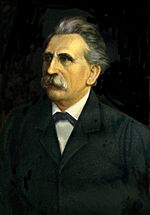Friedrich Wilhelm Weber, Date of Birth, Place of Birth, Date of Death
TweetFriedrich Wilhelm Weber
German politician and poetAbout Friedrich Wilhelm Weber
- Friedrich Wilhelm Weber (25 December 1813 – 5 April 1894) was a German doctor, politician of the Prussian House of Deputies, and poet. Weber was born in Alshausen, near Bad Driburg, in Westphalia.
- His father was forester for the Count of Asseburg.
- Weber first attended the village school, then when thirteen years old he went to the Gymnasium at Paderborn, and afterwards studied medicine at the University of Greifswald.
- His talent for poetry had been evidenced at the gymnasium; at university, it grew.
- After spending two years at Greifswald he went to Breslau, where he became acquainted with Gustav Freitag.
- After a year, however, he returned to Greifswald, where he obtained a doctorate; thence he went to Berlin, where he passed the state medical examination with great honour.
- After a brief journey for recreation to southern Germany he settled as a physician in Driburg, where he spent twenty-six years. His practice as a doctor did not keep him from writing poetry.
- In 1887 he settled permanently at Nieheim.
- In 1863 he was made Sanitätsrat (honorary title given to a distinguished doctor) in recognition of his medical services; he was made an honorary doctor of philosophy by the academy in Munich, and when he celebrated his semi-centennial as a physician he received the Order of the Red Eagle, fourth class, while three years before his death he received the further honour of the title of Geheimen Sanitätsrat.
- He was elected a member of the Prussian House of Deputies.
- He remained a member of the Centre Party until 1893, when he declined a re-election on account of his health. His poetry fell into the genres of epic, lyric, and didactic.
- His early poems were frequently imitations of foreign poets.
- He was also one of the translators who made Scandinavian and English poetry accessible to Germans, including Tennyson's Enoch Arden, Aylmers Field and Maud, and Esaias Tegnér's Axel.
- His reputation, however, was founded on his epic, Dreizehnlinden (1878).
- It enjoyed a wide circulation, and was arranged for the stage; he was nicknamed 'Dreizehnlinden-Weber' after it.
- His second work is his Goliath (1892).
- His Gedichte(1881) and Herbstblätter (1895) were published after his death.
- Other works include Marienblumen (1885), and two other religious poems written for special occasions, Vater unser and Das Leiden unseres Heilandes (1892).
Read more at Wikipedia
See Also
- Famous People's Birthdays on 25 December, Germany
- Famous People's Birthdays in December, Germany
- Famous writer's Birthdays on 25 December, Germany
- Famous writer's Birthdays in December, Germany
- Famous physician's Birthdays on 25 December, Germany
- Famous physician's Birthdays in December, Germany
- Famous poet's Birthdays on 25 December, Germany
- Famous poet's Birthdays in December, Germany
- Famous politician's Birthdays on 25 December, Germany
- Famous politician's Birthdays in December, Germany
- Famous translator's Birthdays on 25 December, Germany
- Famous translator's Birthdays in December, Germany
- Famous physician writer's Birthdays on 25 December, Germany
- Famous physician writer's Birthdays in December, Germany


 Date of Birth:
Date of Birth:  Place of Birth: Alhausen, North Rhine-Westphalia, Germany
Place of Birth: Alhausen, North Rhine-Westphalia, Germany